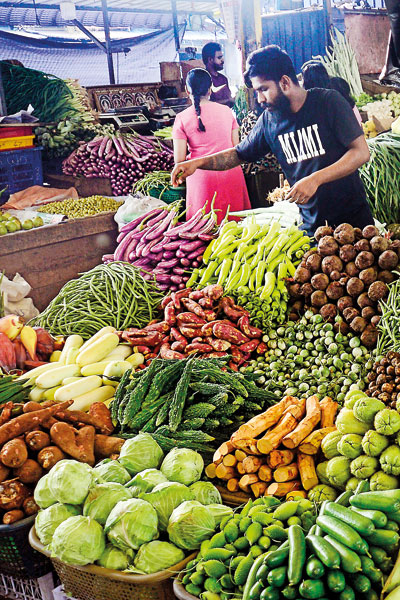Sunday Times 2
The urgent need for a robust food safety policy for Lanka
View(s):By Anon
Food safety is far more than a technical issue—it is the bedrock of public health, economic stability, and environmental sustainability. Yet, Sri Lanka teeters on the edge of a silent crisis due to the absence of a unified, well-enforced food safety policy. This failure impacts every citizen and creates ripple effects across health, agriculture, and international trade.
The current food safety landscape
Sri Lanka has several agencies addressing food safety, including the Ministry of Health, the Department of Agriculture, and the Sri Lanka Standards Institution (SLSI). However, these efforts remain fragmented, operating without a cohesive national strategy. Key weaknesses in the system include the lack of a central governing body, insufficient monitoring systems, weak enforcement mechanisms, and low consumer awareness. Additionally, non-compliance with international benchmarks has led to export rejections and diminished trust in local agricultural products. This disjointed approach creates vulnerabilities across the food supply chain and undermines public confidence.

Sri Lanka teeters on the edge of a silent food crisis due to the absence of a unified, well-enforced food safety policy. File picture
Consequences of policy neglect
The absence of a robust food safety framework has far-reaching consequences:
1. Public health threats: Foodborne illnesses like salmonella, E. coli, and pesticide poisoning pose severe risks to the population. Preventable diseases linked to unsafe food increase hospitalisations and strain already burdened healthcare systems. Globally, foodborne illnesses claim hundreds of thousands of lives annually, with countries like Sri Lanka disproportionately affected.
2. Economic losses: Non-compliance with international safety standards costs Sri Lanka millions in rejected exports, diminishing its competitiveness on the global stage. Food wastage and contamination-related recalls further exacerbate economic losses, depriving farmers and producers of vital income opportunities.
3. Environmental damage: Excessive pesticide use and agricultural chemicals pollute soil and water sources, jeopardising food sustainability. The long-term degradation of natural resources also reduces future agricultural potential and compromises the health of ecosystems.
4. Consumer mistrust: Chemical contamination, unhygienic processing, and food adulteration erode public confidence in locally produced food. This has driven a preference for imported products, financially straining consumers while sidelining domestic farmers.
Transforming challenges into opportunities
A comprehensive food safety strategy could redefine Sri Lanka’s food system, converting its challenges into actionable opportunities. Key steps include:
1. Strengthening regulatory frameworks: Creating an independent Food Safety Authority, modelled after the European Food Safety Authority (EFSA), would centralise oversight and enhance regulatory efficiency. Harmonising food safety protocols with global standards like Codex Alimentarius and the EU’s Farm to Fork Strategy would further boost compliance and improve access to global markets.
2. Enhancing surveillance and monitoring: Modernising food testing laboratories would facilitate faster identification of contaminants, improving public health outcomes. Additionally, digital traceability systems across the food supply chain would increase transparency and mitigate risks effectively.
3. Empowering stakeholders: Training programmes for farmers and food processors focusing on Good Agricultural Practices (GAP) and Good Manufacturing Practices (GMP) are vital to elevating safety standards. Nationwide campaigns to educate consumers on hygiene practices would foster healthier habits and reduce food-related health risks.
4. Promoting sustainability and global competitiveness: Encouraging sustainable agricultural practices, such as reducing pesticide use and expanding organic farming, would not only enhance food quality but also protect natural resources. Supporting compliance with export standards would open doors to untapped markets, boosting economic resilience.
Call to action
Sri Lanka’s food safety system stands at a critical crossroads. Establishing a robust, unified policy framework is not just a regulatory necessity—it is an urgent moral and societal obligation. Food safety reform must become a priority for policymakers, industry leaders, and civil society. Collaborative action can safeguard public health, restore trust, and elevate Sri Lanka’s global standing in the food sector. This is the moment for decisive leadership to secure a sustainable and equitable future for all.
Further reading
For readers interested in deepening their understanding of food safety challenges and opportunities in Sri Lanka, the following resources are highly recommended:
1. European Food Safety Authority (EFSA) – Learn how the EFSA provides independent scientific advice on food-related risks and supports food safety policies across Europe. efsa.europa.eu
2. Codex Alimentarius: International Food Standards – Explore the global food safety and quality standards set by the Codex Alimentarius Commission, established by the FAO and WHO. fao.org
3. The EU’s Farm to Fork Strategy – Discover how the European Union is transitioning to sustainable food systems through its Farm to Fork Strategy, promoting fair, healthy, and environmentally friendly food production. food.ec.europa.eu
4. Strengthening Food Safety in Sri Lanka – Learn more about the EU-funded BESPA-FOOD project and its efforts
to modernise food safety policies in
Sri Lanka. bespafood.eu
5. Ensuring Food Safety in Sri Lanka: Dietary Exposure and Related Risks – This detailed report by the National Science Foundation explores dietary risks and policy recommendations for food safety improvements. nsf.ac.lk
6. Food Safety Standards in Sri Lanka: What You Need to Know – A guide to the Food Act No. 26 of 1980, covering food hygiene, labelling, and international trade compliance. health.gov.lk

